- Education
-
Research
Current research
Talent
-
Collaboration
Businesses
Government agencies and institutions
Alumni
-
About AU
Organisation
Job at AU
The Inauguration of Center of Proteins in Memory, PROMEMO, took place on 4 April 2018.
2018.04.27 |
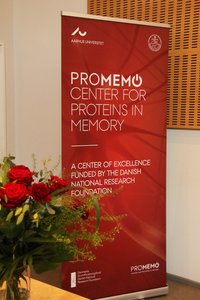
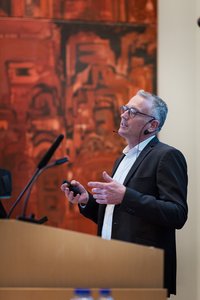
Center Leader Professor Anders Nykjær. Credits: Ida Jensen, AU Photo.
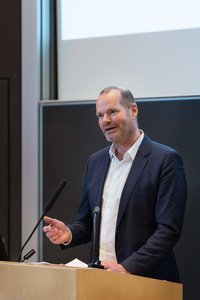
Dean of Health Faculty Lars Bo Nielsen. Credits: Ida Jensen, AU Photo.
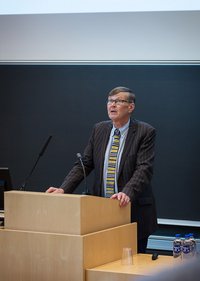
DNRF board member Professor Eero Vuorio. Credits: Ida Jensen, AU Photo.
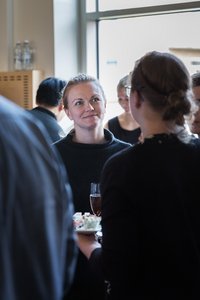
Reception after the Inauguration. Credits: Ida Jensen, AU Photo.
On 4 April, the Center for Proteins in Memory, PROMEMO, was officially opened by a ceremony followed by a mini-symposium on memory.
We were happy to see participation from almost 100 guests, colleagues and representatives from the Danish National Research Foundation, the Faculties of Health and Science and Technology as well as from other foundations, making this a festive and memorable day for us.
After a short welcome by Head of Department of Biomedicine Professor Thomas G Jensen, the Dean of the Faculty of Health, Professor Lars Bo Nielsen emphasized the significance for the faculty and Aarhus University of hosting a Center of Excellence. In particular, the makeup of PROMEMO is unique, he said, since the partners not only comprise established scientists from two faculties but also leading researchers recently recruited from abroad. Hence, PROMEMO speaks to the success of Aarhus University in strengthening internationalization and exemplifies a successful tradition for interdisciplinary and interfaculty initiatives.
Professor Eero Vuorio, board member of the Danish National Research Foundation, officially opened PROMEMO by giving a speech, in which he appraised PROMEMO for an intriguing and ambitious research proposal. If PROMEMO meets some of their endeavoring objectives, this will have substantial impact on our understanding how memories are encoded and stored. He ended up by wishing PROMEMO great success with its future endeavours.
Finally, Center Leader of PROMEMO, Anders Nykjær, provided a short overview of the scientific strategy and perspectives of the center and presented the partners and their competences, relationships with DANDRITE, NeuroCampus Aarhus, and national and international research partners.
Following a well-attended reception, the afternoon mini-symposium on memory comprised two talks from the invited speakers Professor Clive R. Bramham, University of Bergen, Norway, and Professor Sumantra Chattarji from National Center for Biological Sciences, Bangalore, India and two short presentations by the PROMEMO partners Professor Marco Capogna, and Assoc. Professor Sadegh Nabavi.
The guest speakers presented their most recent work on the role of proteins and circuits in memory acquisition and storage, putting into perspective the scientific goals and questions to be addressed by PROMEMO.
Dr. Bramham presented an overview of his recent work aiming to elucidate key roles of certain molecular processes, such as Arc or non-coding RNA regulation, underlying long-term synaptic plasticity and memory.
Dr. Chattarji addressed the dynamics between three pivotal brain areas for emotional memory processing, namely prefrontal cortex, hippocampus and amygdala. His findings highlight unique features of stress-induced plasticity in the amygdala, which are in striking contrast to those seen in the hippocampus and cortex. This dicotomy could have long-term consequences for pathological fear and anxiety exhibited in people with affective disorders.
Complementing these talks, Drs. Nabavi and Capogna presented part of their recent observations and PROMEMO projects.
Dr. Nabavi explained his plans to identify novel proteins essential for synaptic plasticity and emotional memory. His novel approach promises to obtain unprecedented spatial resolution by using optogenetics, to focus only onto neuron-neuron contacts (synapses) that are activated to encode a memory.
Dr. Capogna followed up on this by proposing that emotional memory is stored and retrieved via changes of synaptic weights in oscillatory neuronal circuits. Furthermore, he suggested that synaptic plasticity underlies the formation and disruption of memory traces, so-called engrams.
The external keynote speakers also mentioned their plans to interact and collaborate with PROMEMO using either a bottom-up approach from molecules to behavior (Bramham) or a top-down strategy from behavior to molecules (Chattarji).